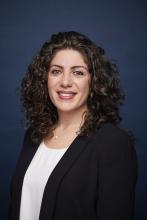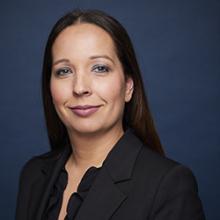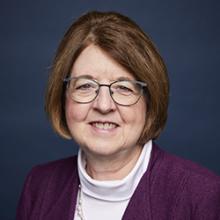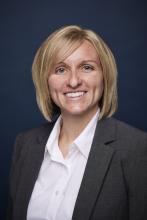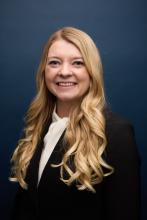A new nursing collaborative sets out to explore sleep and circadian science
By Jen A. Miller
A good night’s sleep doesn’t just feel good—it’s critical to your quality of life. In adults, sleep helps maintain brain function as well as mental and physical health. In children, it’s a key factor in growth and development. On the flip side, lack of sleep has been tied to higher risk of coronary heart disease, hypertension, impaired immune function, high blood pressure, obesity and stroke. In 2017, research into circadian rhythms won the Nobel Prize in physiology or medicine. It’s just that important.
“In a 24-hour day, we spend one-third of that time sleeping,” said Elliane Irani, PhD, RN, assistant professor at Case Western Reserve University’s Frances Payne Bolton School of Nursing. “We ought to be focused on sleep with the same emphasis as diet and physical activity when it comes to maintaining health.”
That’s why Case Western Reserve researchers formed the Sleep and Circadian Science Collaborative (SCSC), in October 2022. The group meets regularly to share resources and insights, and to collaborate on new research in this emerging field.
Studying sleep at all ages
When Stephanie Griggs, PhD, RN, and Valerie Toly, PhD, RN (NUR ’90; GRS ’09, nursing), co-chairs of the SCSC, realized they were just two of many faculty members at the School of Nursing who were studying sleep, they decided working together was better than working apart.
Now, the six faculty members in SCSC “work across the lifespan” of patients, said Toly, the Carl W. and Margaret Davis Walter Professor of Pediatric Nursing. She, for example, studies the sleep patterns of parents of children who require around-the-clock care. Griggs, an associate professor at the nursing school, studies the sleep of young adults with Type 1 diabetes, while Irani focuses on the sleep of family caregivers of adults with chronic conditions. And Assistant Professor Christine Horvat Davey, PhD, RN, focuses on sleep in older adults with HIV. Despite the range of their research and who it focuses on, their work is enriched by coming together through the collective.
The group provides more than just a way to talk about research. They work to promote the collaboration of scientists and clinicians who can share their experiences and resources that will advance the field of sleep and circadian rhythm science.
By combining their efforts, they are strengthening each other’s publications, grant proposals, research and interpretations of their findings. So far, with the support and collaboration of the group, members have produced 12 papers and have co-presented at conferences on topics including sleep health in caregivers of the critically ill; the impact of isolation on sleep and mental health during the first year of the COVID-19 pandemic; and sleep health’s association with glycemic target achievement in young adults with type 1 diabetes.
They’ve also received National Institutes of Health grants to further study some of these topics, including sleep self-management in young adults with type 1 diabetes and determinants of sleep health, and cardiovascular risk among Black family caregivers.
“We’re sharing ideas and brainstorming challenges when it comes to sleep research, whether it’s data collection, how to approach participants and talk to them about sleep research, or how to address some of their questions related to sleep,” said Irani. “At this point, it’s also about how to really make sense of the data and analyze it.”
The SCSC is also one of the few sleep research groups that’s based in a school of nursing instead of medicine, which Griggs says makes it stand out because of nurses’ holistic approach to care.
“We all have clinical backgrounds and have spent a great deal of time with people and their families…but then we also have the research aspect,” Griggs said. “We’re really bringing in a rigorous systematic approach to studying sleep.”
Forming a leading research hub for sleep science
Less than two years in, the collaborative is also helping establish Frances Payne Bolton School of Nursing as a recognized hub for excellence in sleep and circadian science. Megan Alder Wenzell, PhD, RN (GRS ’21; nursing), returned to her alma mater in August 2022 to join the faculty as an assistant professor.
“I was drawn to coming back because of the strong sleep group they were forming. It’s nice to have a collaborative group to bounce ideas off of,” she said, even if her work—studying sleep in children with autism—is different from that of other researchers in the group. “We can talk about different algorithms, watches, devices or other things that might be helpful to our research programs,” she added.
To develop the pipeline, Griggs said, the group also started a training program for postdoctoral fellows and has a handful of PhD students who are interested in sleep and circadian science.
And because sleep is a key element of so many parts of health, the collaborative hopes to work with faculty members from all over the university. “Think of us as the glue that holds everything together.," Griggs said. “We intersect with several disciplines, and the synergy this creates truly strengthens our scientific advancement.”
Cross-pollination of ideas is already happening. Griggs, for example, is on a dissertation committee for a sociology student; Toly collaborates with a statistician in the Department of Population and Quantitative Health Sciences at Case Western Reserve School of Medicine; and Horvat Davey has worked with an undergraduate student in nutrition to help develop electronic sleep diaries.
“We’re a very open group and very collaborative,” Horvat Davey said. “If someone did have something they’d like to bring to our group to talk about and receive our feedback, we’re happy to talk through some ideas, potential research projects, resources and maybe some collaborations that might benefit their work.”
For more information or to collaborate, email sleepscience@case.edu.
This article appears in the print edition of Forefront magazine, summer 2024. Find more stories from Forefront at case.edu/nursing/news-events/forefront-magazine.



